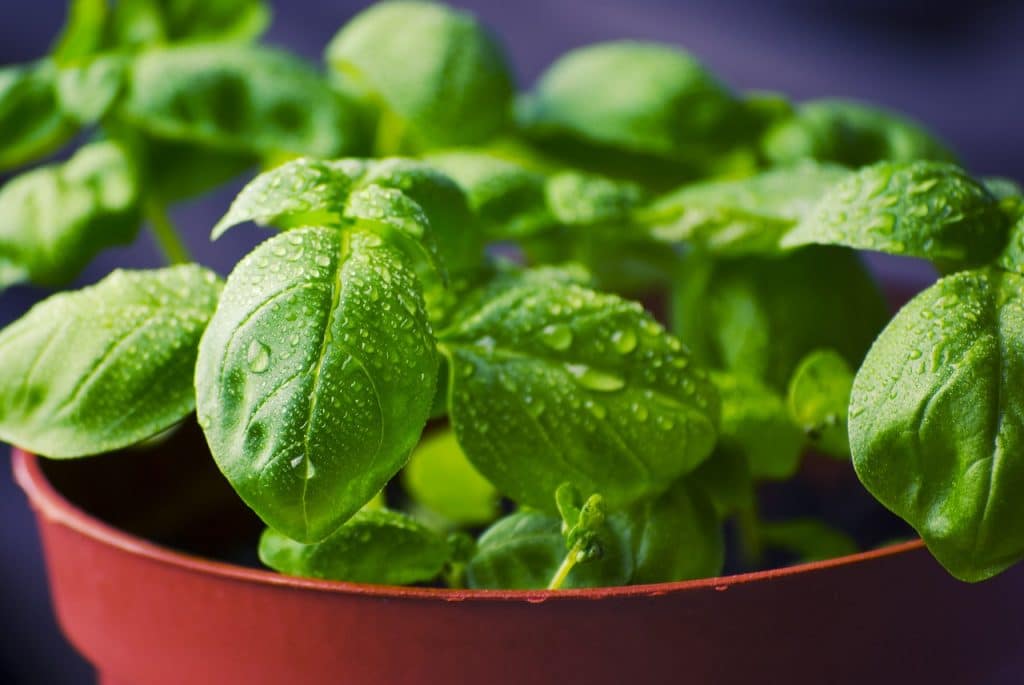Osimum basilicum
Residence in Bulgaria:
According to unconfirmed data, the herb was brought here by the Asparukh Bulgarians. Basil constantly accompanies the lives of real Bulgarians, it is grown in every house. It grows eternally, ineradicably over Christ's tomb, to point to it as a heavenly sign. Basil is planted and grown here in gardens or in pots in homes.
Description:
An annual herbaceous plant with a pleasant, characteristic aroma. The stems are 30–50 cm long, four-edged, branched from the base. Leaves are opposite, long-stalked, ovate, 3–5 cm long and 2–2.5 cm wide, almost entire or sparsely toothed. The inflorescence is interrupted, spike-shaped, formed by small-flowered spines. The flowers are white, rarely pink. The stamens are 4, two longer and two shorter, curved downwards, sticking out from the corolla. When ripening, the fruit splits into 4 black-brown nuts
Usable parts:
Leaves and flowers. Cut off with a sharp knife the entire leafy part up to 20–25 cm from the tip downwards, always during abundant flowering
Collection time:
June - August
Composition of the herb:
Contains approx. 1.5 % essential oil, which includes methyl chalvicol, linalool, cineole, eugenol, geraniol, p-cymol, myrcene. It also contains tanning substances, one glycoside, one saponin, mineral salts, organic acids, etc
Therapeutic effect:
It calms the soul and the body, increases heart activity, relieves children's diarrhea. Basil essential oil has a sedative, antimicrobial, anticonvulsant and antitussive effect
Usage:
For runny nose, angina, uroinfections, colitis, neuralgia,diabetes, ulcer, periodontitis of the oral cavity, toothache, chronic bronchitis, gasped and asthma. Insomnia. It is also used for nephritis, inflammation of the prostate, pains during urination, intestinal infections, flatulence. It helps with pus in the middle ear and periodontal disease. Externally, it is used for washing in case of eczema, wounds, pus in the ears, sore throat.
Ways of use:
Internally: 50 g of finely chopped drug is poured with a liter and a half of boiling water, let it soak until it cools down, then strain and drink 100 ml 2-3 times a day - daily dose 300 ml. The same infusion is used for gargling and as an application for edema and eczema. It can also be used in the form of a tincture of 70 % alcohol and 10 % drug, taking 20 drops in a little water, 3 times a day.
Externally: In the form of poultices for eczema, wounds, sore throat, inflammation of the middle ear. The drug is not toxic, but in large doses it strongly irritates the mucous membranes!
Bulgarian traditional usage:
Basil is a garden flower with very small, white flowers and a strong, pleasant smell that persists even when dried. It gives it an advantage over the other flowers with which it is in dispute for beauty (Alenia, large-flowered peony, Zdravets). Basil is grown in almost every house and accompanies a Bulgarian throughout his life, because it is a flower from which all evil flees. He is sung in folk songs, mostly with the epithets "small, small" and "wound". Also mentioned is “Greek basil", which has larger flowers, but in customs and rites the small one is preferred. Basil is used fresh or dried, but must be in bloom. It is considered "Christ flower", "cross flower". It grows ineradicably over Christ's tomb to point to it as a heavenly sign. In Burgas, it is believed that Basil helps to see the heavenly world on the night before Christmas, because then the sky opens before the eyes of the righteous. A woman who wants to see the miracle roasts a cow and sticks a dry stalk in it Basil. Ifrighteous, until the morning it leaves and she sees the open sky.
In Sliven, there is a belief that this is the only flower that goes to heaven. Basil has an important place in the making of a plant man. Nine sisters passionately desired to have a brother and made a human-like figure out of a stump, holding hands Basil and they clothed her in men's clothes. God heard their fervent pleas, breathed soul into the figure, and so it turned into a man.
Basil gives extra power to the spell, so fortune-tellers use it during the ritual or place it near them. S Basil make and break spells, especially for binding, ie. deprivation of the ability to have sexual intercourse. It is worn in the bosom during the Dirty Days for protection from evil forces. The herb is next to the lehussa's bed, they also give her to drink a tincture with sugar in case of a difficult birth. It is used in the water for bathing the baby until the 40th day and in the ritual purification of the lehusa and the family among the Bulgarian-Mohammedans. On a stalk Basil the placenta dries up when a child is born with a "shirt". She protects against a bullet.
Босилекът се свързва с младостта и чистотата и в народните песни босилековата китка е синоним на младоженец. Китки от Basil worn by maidens to attract bachelors and for health. They are exchanged between young people as an official declaration of their love as a sign of future marriage.
S Basil, sprinkled around a dying person, his agony is relieved. It is placed in the bath water of a dead person and in the wrists that are placed with him. Popes, perceived as "children of God", were buried with wristbands only by Basil. When a pregnant woman has to say goodbye to a dead man, she brings him a yellow flower, and takes Basil from his wrists, with which he rubs himself and his baby after birth, so that they are not as yellow as a dead man. Wrists Basil are given to the living for health and to commemorate the dead. Almost every Bulgarian house has a dryer Basil, he was given the most honorable place - next to the icons.
The herb is put into the wine while it boils. It banishes all evil, but the ritually processed Basil has greater protective and healing power. On Blagovec, a snake is killed, the head is filled with seed from Basil и се заравя в градината, за да прорасне растението през главата. На Гергьовден се коли черно агне като жертва и китка от растението се натопява в кръвта му. На Благовец носят в църквата Basil, който се освещава от попа. На Макавей се взема босилекова китка, с която попът ръси по къщите, а нему се дава друга, също от Basil. On Easter, women wear wristbands to church Basil, who spend the night there, and at the morning festive service the priest consecrates them and takes them home, they are placed on the icon for healing. Basil it is burned (smoked) in the hearth to ward off diseases.
With a decoction of Basil in vinegar and salt, goiter and "swallowed snake" (sickness) are treated, and with juice from its leaves - earache. With a twig Basil a burn cream ointment is mixed.
При грип болният се напушва над сух basil and rosehip. For fever, drink a decoction of Basil, wild blueberries, hemp seed, Zdravets, strawberry root, snakeskin, horsetail and flax seed. For shortness of breath, drink a decoction of Basil, leek and Vetrogon. Decoction of Basil.
Among the Istravians, the lehusa drinks a decoction of Basil, Loboda, honey and the seeds of all cultivated plants in the settlement. For worms in children, they are given coffee made from rye and ricin seeds, boiled in basil water.
A three year old Basil, together with Broch root and Raturov flower, boiled in three-year-old wine, induce menstruation at the critical age. With a decoction of Basil, Peony and Trendafil wash children's faces to remove pimples. Aqueous tincture of Basil and vine shoots is recommended for frequent fainting. Basil extract in rose water is dripped into the eyes for sore eyes. Snotty children are incensed with a mixture of Basil. Together with an apple, it is used in the composition of drops for eye pain, etc.
Not to be used by pregnant and lactating women!
Diabetics should follow a strict diet when using basil.
Do not use for a long time.
Name in English:Basil
Name in German:Basilicum
Name in German:herbe royale, Basilie

